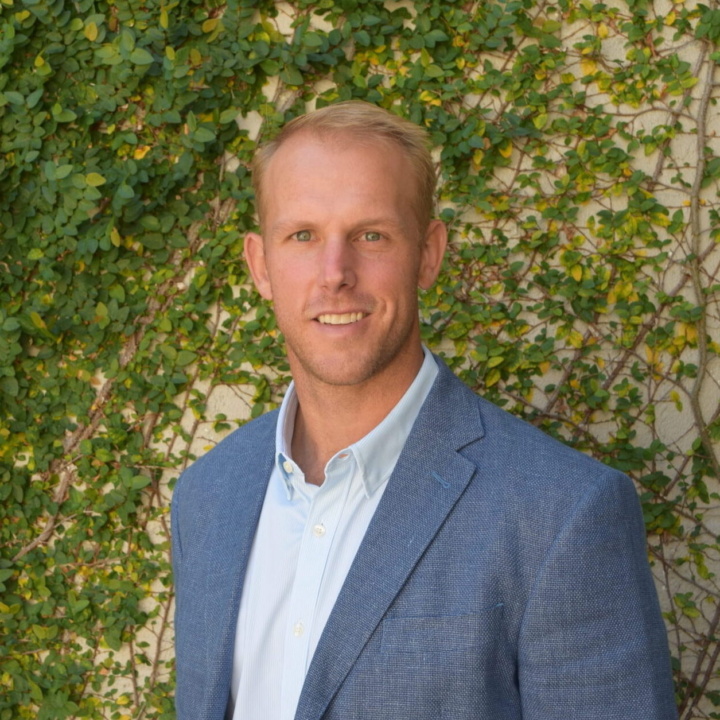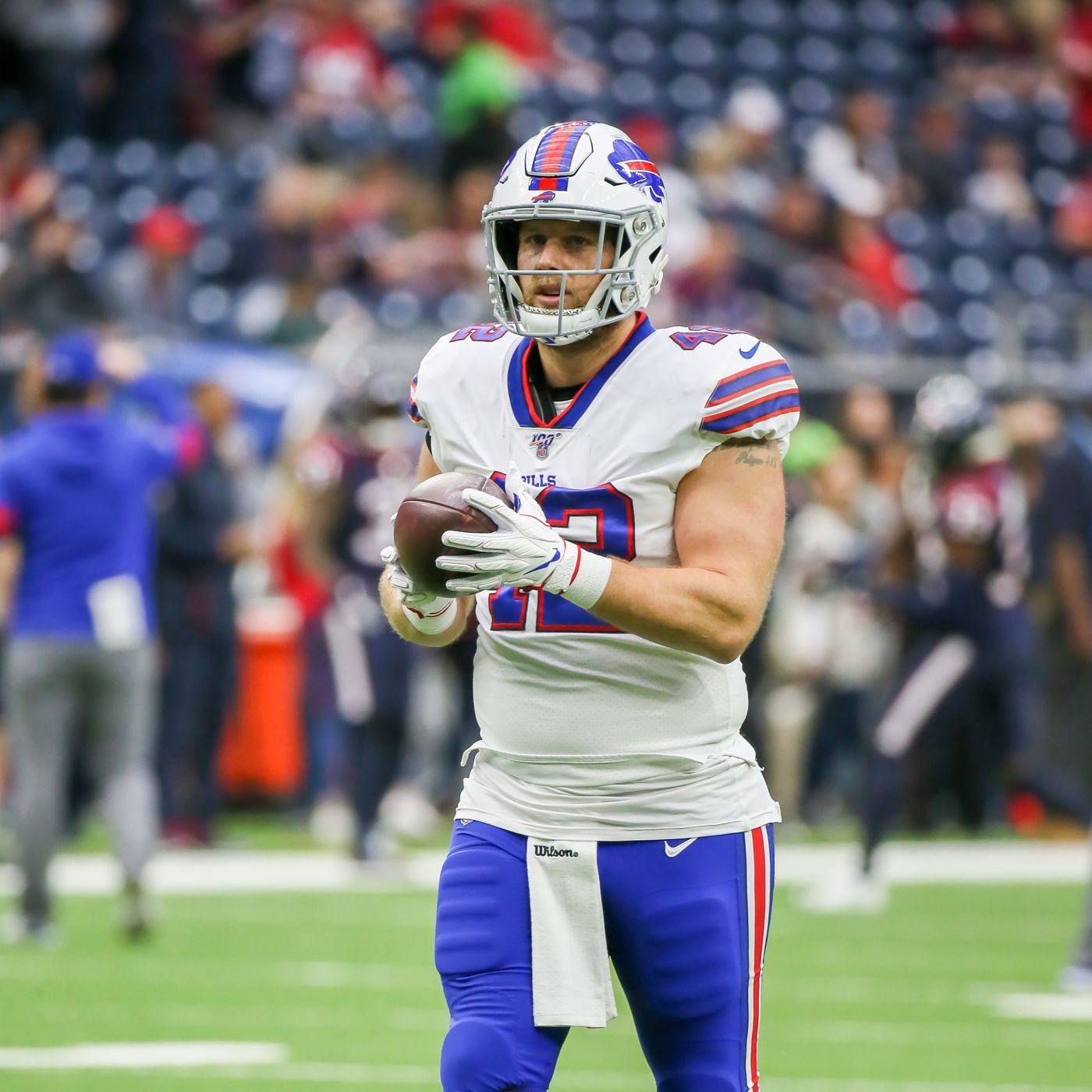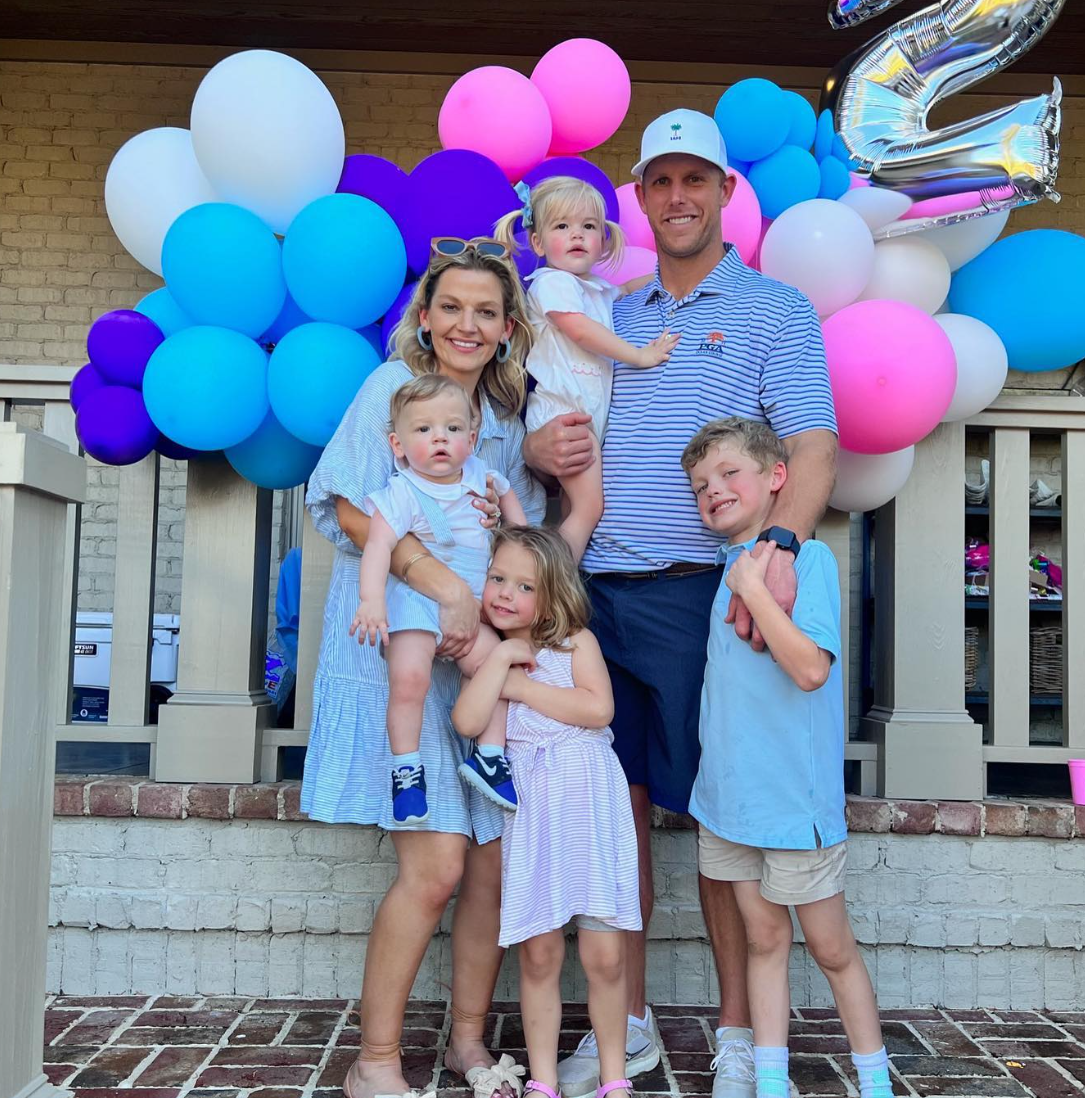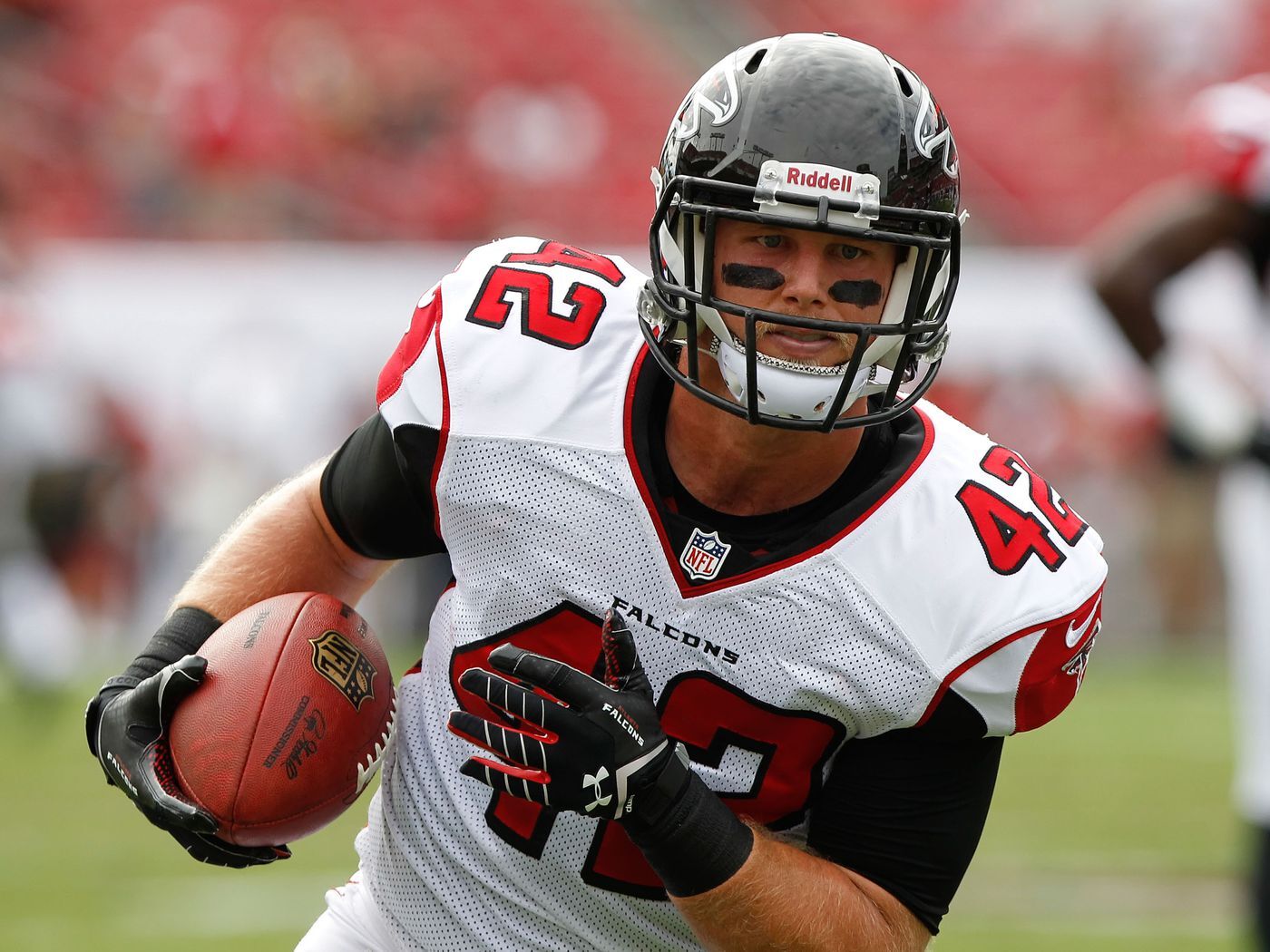
Catching Up With Former Player Rep: Patrick DiMarco
A graduate of the University of South Carolina, Patrick DiMarco declared himself a free agent before signing with the San Diego Chargers in 2011. DiMarco went on to play 10 years in the league as a running back/fullback for the Chargers, Chiefs, Falcons, and Bills. During his time in the NFL, DiMarco earned All-Pro and Second-Team All-Pro honors and served as an NFLPA Player Rep. Patrick continues to stay involved with the NFLPA as he now serves as the Chapter President of the NFLPA South Carolina Former Player Chapter. We caught up with Patrick and he gave us insight into life after football.

What inspired you to become a Player Representative?
I started off as an alternate with Matt Bryant when I was in Atlanta during my third year in the NFL. What really got me interested in starting was when Matt told me that he was getting a free trip to Hawaii. After my first meeting, I then realized how big the scope of the NFLPA was and how important the Player Rep role actually was. Yes, the trip to Hawaii was pretty cool, but it actually opened my eyes to the business of the NFL Players Association and how important the reps are from the standpoint of making sure that teams are abiding by the CBA, and making sure that the players are informed on all of the information that they need. The biggest thing that ended up getting me hooked was the benefits that are offered through the NFLPA. They helped inform guys and helped us understand what we needed to do in order to get our benefits.
What lessons and experiences did you take away from being a Player Rep?
So, I served on the finance committee, financial literacy committee, and the agents committee while I was a Player Rep. I sat on as many different committees as possible, because I wanted to absorb and learn everything. For my experience with the executive committee, I was encouraged during my first meeting and all following meetings by how sharp the leaders were within the NFLPA. They were forward thinking, and not just thinking in the moment, but how the CBA is set for future players as well. It’s also a very cool aspect to have former players and former Player Reps there to enlighten us on where we were, how we got to where we are, and what we need to do for the future.
Why do you think more players should be involved or be active with the NFLPA?
I think knowledge is power, and power is money. I think it’s important for guys to get involved, even if it is just to learn. I was the Player Rep for the Buffalo Bills all four of my years there, and we voted on the most recent CBA in 2020. That season, the NFL wanted to move to playing 17 games. Playing 17 games is about a 6% increase in games played, and just one injury could take you completely out. That was my last year, and I knew my career was about to end. I was very conflicted, because I knew the benefits, revenue share, and the salary implications of playing an extra game, but playing one more game could be physically tough. I called Josh Allen and Tremaine Edmunds, who were two first round picks just two years prior. They knew I was the voting rep for the team, and I told them that I had my own views on the idea, but I wanted to hear from them. They said that they wanted to be the best player that they could be, and if that meant playing 17 games, then they were ready to go out there and win. I knew that those guys were going to be studs and they are still playing at an extremely high level.

What is one piece of advice that you have for players that are transitioning out of the NFL?
It was a tougher transition than I expected. I like to think I’m a decently smart person and have pretty good structure in my life. The biggest thing that you need to know is your purpose, not just while playing football, but outside of football. I played football starting in third grade, through high school and college, and then 10 years in the NFL. I knew where I fit into society and knew what my goals were going into each season. So, once I was removed from that, I didn’t know exactly what I wanted to do. I did explore things while I was playing. I did internships, externships, a couple boot camps through the NFLPA, and those did help me narrow down what I wanted to do. I was a business major in college, specifically marketing and management. Those are both so broad, so it’s hard to put a finger on what exactly it is that you want to do. Going back to college, my goal was to play in the NFL. I’m thankful that I was able to achieve that goal. However, I wish I would have been more hyper focused when I was in college to be able to lay the path to where I wanted to be post college, and for life after football. I played in the NFL until I was 32 years old, and pension doesn’t kick in until I’m 55 years old. I have 23 years to bridge that gap.
I’m still finding my niche. I pursued coaching right out of the NFL. I retired because I got a neck injury, and I wasn’t able to play anymore. There were three things that I thought about pursuing. They were wealth management, commercial real estate, or commercial insurance. Those three things are very individual driven, like “eat what you kill.” So, I knew it was going to be based on me. While I was exploring those things, Coach Beamer, who is now the head football coach at the University of South Carolina, called and asked me if I wanted to get into the coaching world. I immediately told him “No way, I’ve seen the coaching life.” At the time I had three young kids, so I felt like I couldn’t do it. So, I continued to explore other options. However, my wife, Kristen, told me that if I passed on this now, I was always going to wonder what if I had pursued coaching. She said, five years from now, you don’t want to sit back and regret the opportunity of not pursuing a passion of yours. I ended up taking the job in South Carolina. I worked there for about a year and a half, and realized it wasn’t what I wanted. From a lifestyle standpoint, the coaching life was going to be a lot of moving all over the place, and that’s not what I wanted for my family.
What are you doing in your career now?
I ended up transitioning out of coaching about a year and a half ago. Since then, I’ve been in the real estate development space, which is one of the things that I considered when I retired, and it’s been awesome. Some advice that I would give is to be like a sponge and take advantage of the opportunities that are out there while you are playing. If you do have a passion and a conviction to do something that’s outside of football, chase that in the offseason. There are so many hours in a day, and you can only workout for a couple of those hours. So, in the off season, whether you workout 7 to 9, 11 to 2, whatever it may be, take advantage of those extra hours to do job shadowing, find mentors, and listen to podcasts. There are so many things out there that can help you spark an interest, and then you can pursue those interests at full speed.

How do you feel that the lessons you learned playing football now apply to your post playing career?
They’re very different, because you’re not allowed to hurt people in the real world. A lot of people have misconceptions about what an NFL day looks like. They think you go in and practice for a few hours and then you’re out by lunchtime. That’s not the case. In reality, you go in at six in the morning and don't leave until six at night. It’s a twelve-hour, jam-packed day, from start to finish. It’s a full-time, seven days a week job from July to January or February depending on how far your team makes it. It’s a big time commitment. Time allocation is probably one of the biggest lessons. While I was playing, my wife and I had three kids, so I had to learn how to be present when I was home, and not bring work into my household. I also learned a true work ethic. During the off-season, roughly January through April, you don’t have to do anything. You aren’t required to workout, so if you don’t want to do anything you don’t have to. Off-season training starts up in the middle of April, but if you slack for those four “off” months, it shows. When you show up to the off-season program, you can tell who has and hasn’t been working out. That ties to our commitment to excellence. Another important lesson is communication. You’re communicating with 53 guys in the locker room, the coaches, and the training staff. There are hundreds of voices in an NFL building. It's important to know how to communicate and be precise with that communication. Decision making is also key for a football player. You have a split second to make your decision, and you’re either right or wrong. It’s simple. There’s no gray area. It's either black or white. Now, from the business side, I’m able to sit back and address the situation and do some due diligence. I don’t have to make decisions immediately anymore. If I’m not keen on finances, I can go to our finance guy, or if I don’t understand something to do with construction, I can go to our construction guy. Communication helps with all of that.
What's one piece of advice that you wish you got when you started your NFL career?
I was an undrafted free agent. I signed with San Diego, but I got hurt. I then ended up signing with Kansas City and was kept on the practice squad. One thing that always stuck with me was to always believe in yourself. I remember early on in my career I would play the numbers game a lot, which really messed with my psyche. As rosters shape, it starts with around 90 guys, then gets cut to 75, then 65, and on. I would be sitting in the team meeting rooms and looking around, wondering if there were 12 or 13 guys that I had separated myself enough from to make it on the roster. I didn’t have enough belief in myself at the time. I ended up achieving my goal, but didn’t have that internal belief in myself. This does tie into my life now that I am stepping into the real estate development space. Since I have very little background, I really have to bet on myself. That's probably the biggest thing that I would tell other guys. If you have the will to do it, you’ll find a way to get it done.
What does the NFLPA Fraternity mean to you?
We just started our NFLPA South Carolina chapter. We are in our preliminary year, and I was voted president which has been very exciting. My wife wasn’t happy with me, because it was something else that I took on and put on my plate. We have four young kids now and I’m coaching all of their little league sports, so it’s just another task. I remember when we were at the first meeting, we needed 25 guys to show up, and we had 27 come. I was the main ringleader trying to make sure that guys showed up. I was sending follow-up texts, emails, phone calls, all of it. Then it came time to nominate a president, and since no one was volunteering, they made people start recommending who they wanted. It felt like everyone ended up recommending me, and I knew my wife was not going to be happy, but it has been a really cool experience.
This is a unique community of guys. It’s a very small group, and there aren’t many people who have experienced what we have, with traveling, getting cut, even having our highest income at a really young age. That's extremely backwards. Everyone else in the normal working world makes little in their first years, and then their income grows. While in the NFL, you start at the top and continue to grow, but then there is a pretty big drop off where you have to sustain. Having a group of like-minded people with similar experiences has been huge, especially with the South Carolina chapter. Also, the friendships, communication, and philanthropic events that branch out of the chapter are great. There are so many people doing great stuff in the community here in South Carolina and abroad, and all of that has been brought to light through our chapter.